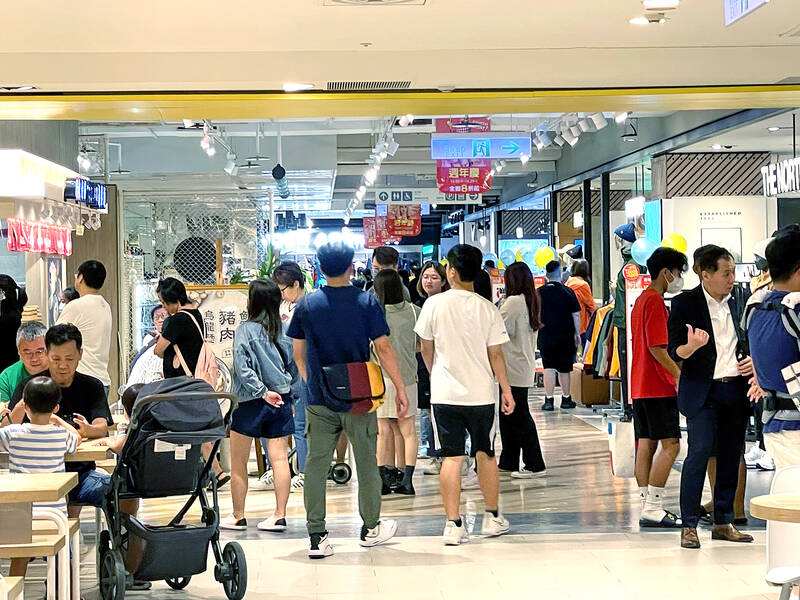Sales in the retail, and food and beverage sectors last month rose 6 and 15.8 percent respectively from a year earlier, while sales in the wholesale sector posted an annual decline for an 11th consecutive month, the Ministry of Economic Affairs said yesterday.
The ministry forecast that retail, and food and beverage sales would continue to grow this month due to anniversary sale events at department stores; seasonal demand for clothing, cosmetics and skin care products; and the effect of the Double Ten National Day holiday.
However, the wholesale sector is likely to experience a sales slump for another month as global economy and trade momentum remains weak, while supply chains continue to adjust inventories, it said.

Photo: Su Meng-chuan, Taipei Times
Last month, the retail sector’s sales were NT$374.7 billion (US$11.58 billion), the highest level for the same month, as people spent more during the Mid-Autumn Festival and retailers enhanced anniversary promotions, while purchases of new vehicles remained strong, the ministry said.
In the first nine months of this year, retail sales totaled NT$3.35 trillion, up 7.7 percent from a year earlier, the data showed.
The ministry said it expects retail sales to grow between 4.8 and 7.8 percent annually to between NT$398.9 billion and NT$410.3 billion this month.
Sales in the food and beverage sector reached NT$83.5 billion last month, rising for a 17th straight month on an annual basis, as catering service providers posted a 29.9 percent rise in sales due to robust demand for in-flight meals, while restaurant sales grew 15.8 percent and sales at beverage outlets gained 11.3 percent because of the holiday effect and special sale promotions, the report said.
In the first nine months, food and beverage sales rose 22.6 percent year-on-year to NT$767.2 billion, while sales this month are projected to grow 11.1 to 14.1 percent to between NT$85.4 billion and NT$87.8 billion, it said.
The wholesale sector’s sales last month were NT$1.07 trillion, down 3.8 percent year-on-year, but up 8.3 percent month-on-month, as demand for machinery equipment, building materials and chemical materials remained lackluster, offsetting that for food, beverage and tobacco products, the report said.
Cumulative sales in the sector in the first nine months fell 9.8 percent to NT$9.65 trillion, and sales for this month are estimated to drop by 0.6 to 3.6 percent to between NT$1.03 trillion and NT$1.06 trillion, the ministry said.

When an apartment comes up for rent in Germany’s big cities, hundreds of prospective tenants often queue down the street to view it, but the acute shortage of affordable housing is getting scant attention ahead of today’s snap general election. “Housing is one of the main problems for people, but nobody talks about it, nobody takes it seriously,” said Andreas Ibel, president of Build Europe, an association representing housing developers. Migration and the sluggish economy top the list of voters’ concerns, but analysts say housing policy fails to break through as returns on investment take time to register, making the

‘SILVER LINING’: Although the news caused TSMC to fall on the local market, an analyst said that as tariffs are not set to go into effect until April, there is still time for negotiations US President Donald Trump on Tuesday said that he would likely impose tariffs on semiconductor, automobile and pharmaceutical imports of about 25 percent, with an announcement coming as soon as April 2 in a move that would represent a dramatic widening of the US leader’s trade war. “I probably will tell you that on April 2, but it’ll be in the neighborhood of 25 percent,” Trump told reporters at his Mar-a-Lago club when asked about his plan for auto tariffs. Asked about similar levies on pharmaceutical drugs and semiconductors, the president said that “it’ll be 25 percent and higher, and it’ll

CHIP BOOM: Revenue for the semiconductor industry is set to reach US$1 trillion by 2032, opening up opportunities for the chip pacakging and testing company, it said ASE Technology Holding Co (日月光投控), the world’s largest provider of outsourced semiconductor assembly and test (OSAT) services, yesterday launched a new advanced manufacturing facility in Penang, Malaysia, aiming to meet growing demand for emerging technologies such as generative artificial intelligence (AI) applications. The US$300 million facility is a critical step in expanding ASE’s global footprint, offering an alternative for customers from the US, Europe, Japan, South Korea and China to assemble and test chips outside of Taiwan amid efforts to diversify supply chains. The plant, the company’s fifth in Malaysia, is part of a strategic expansion plan that would more than triple

Taiwanese artificial intelligence (AI) server makers are expected to make major investments in Texas in May after US President Donald Trump’s first 100 days in office and amid his rising tariff threats, Taiwan Electrical and Electronic Manufacturers’ Association (TEEMA, 台灣電子電機公會) chairman Richard Lee (李詩欽) said yesterday. The association led a delegation of seven AI server manufacturers to Washington, as well as the US states of California, Texas and New Mexico, to discuss land and tax issues, as Taiwanese firms speed up their production plans in the US with many of them seeing Texas as their top option for investment, Lee said. The